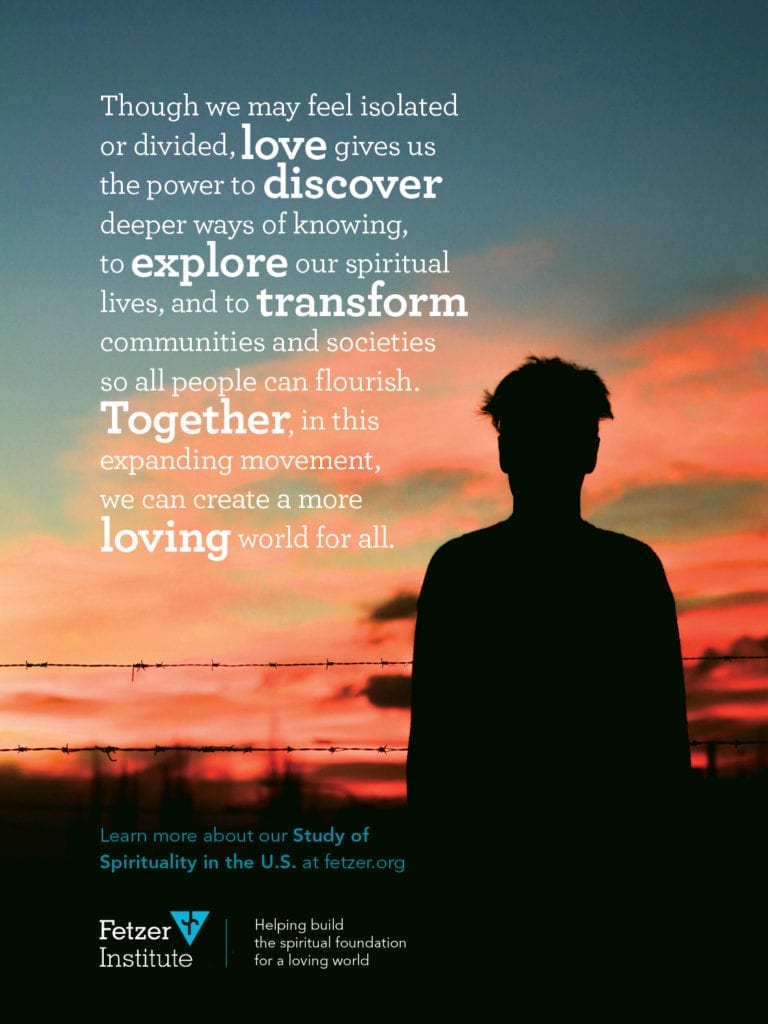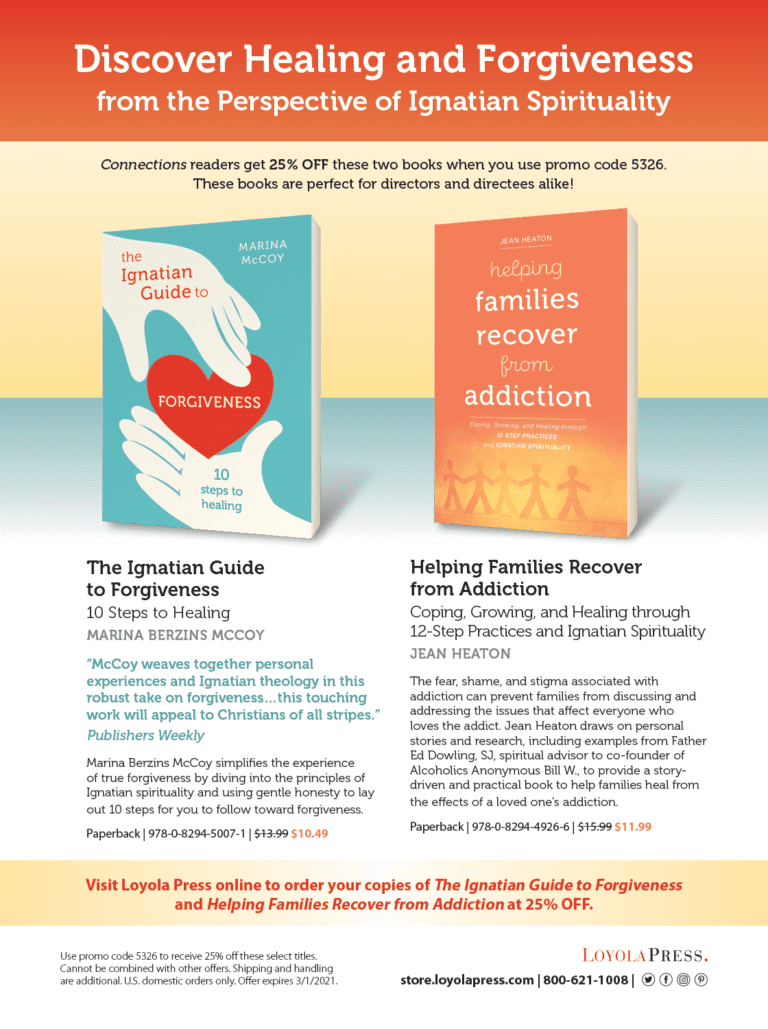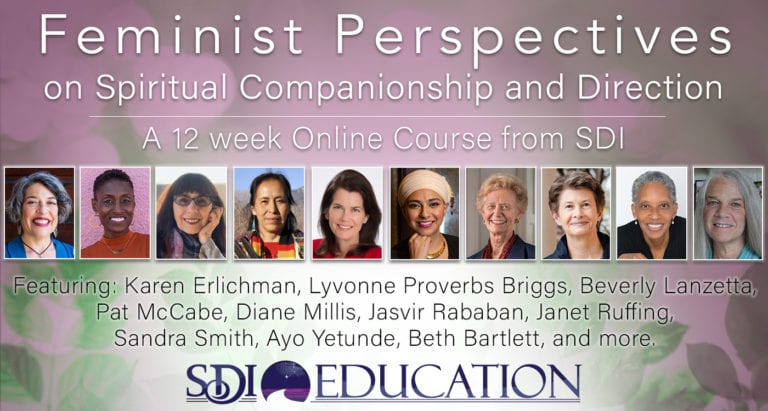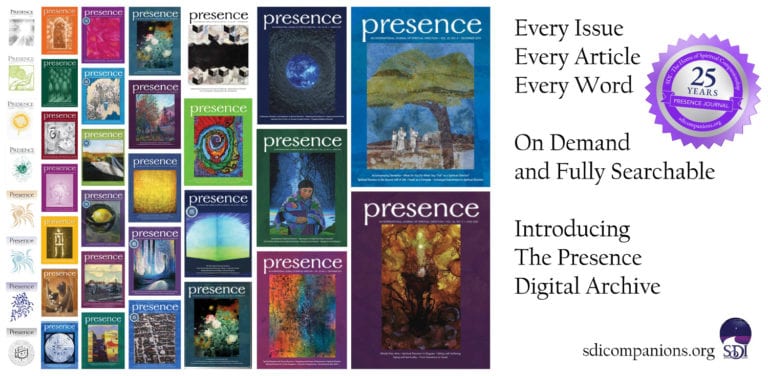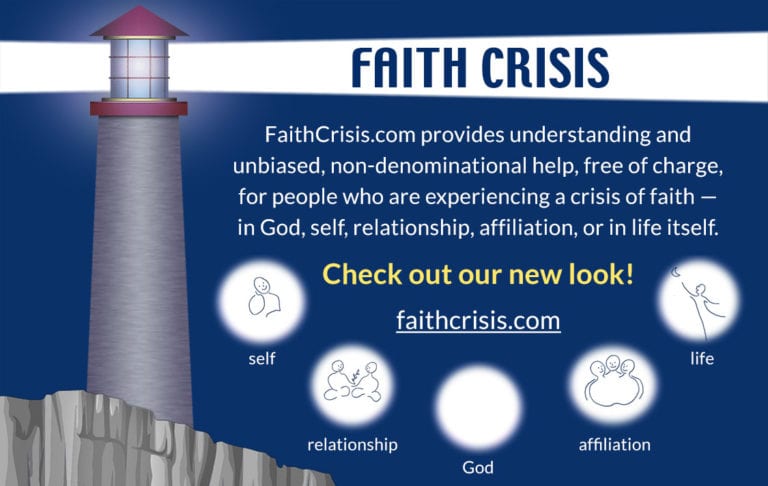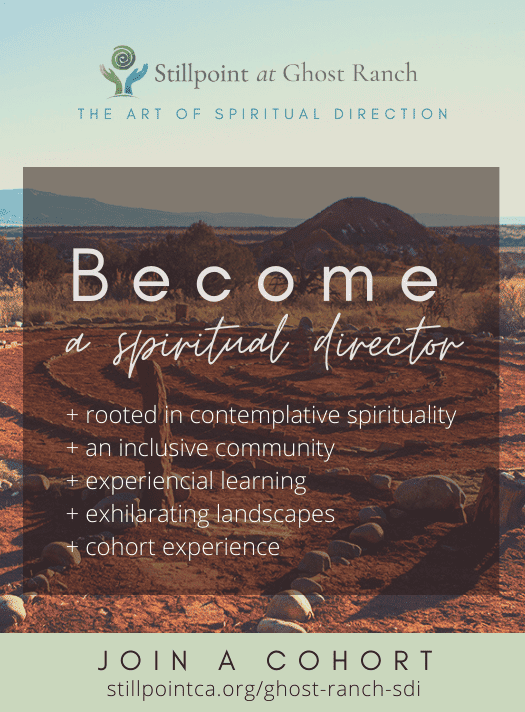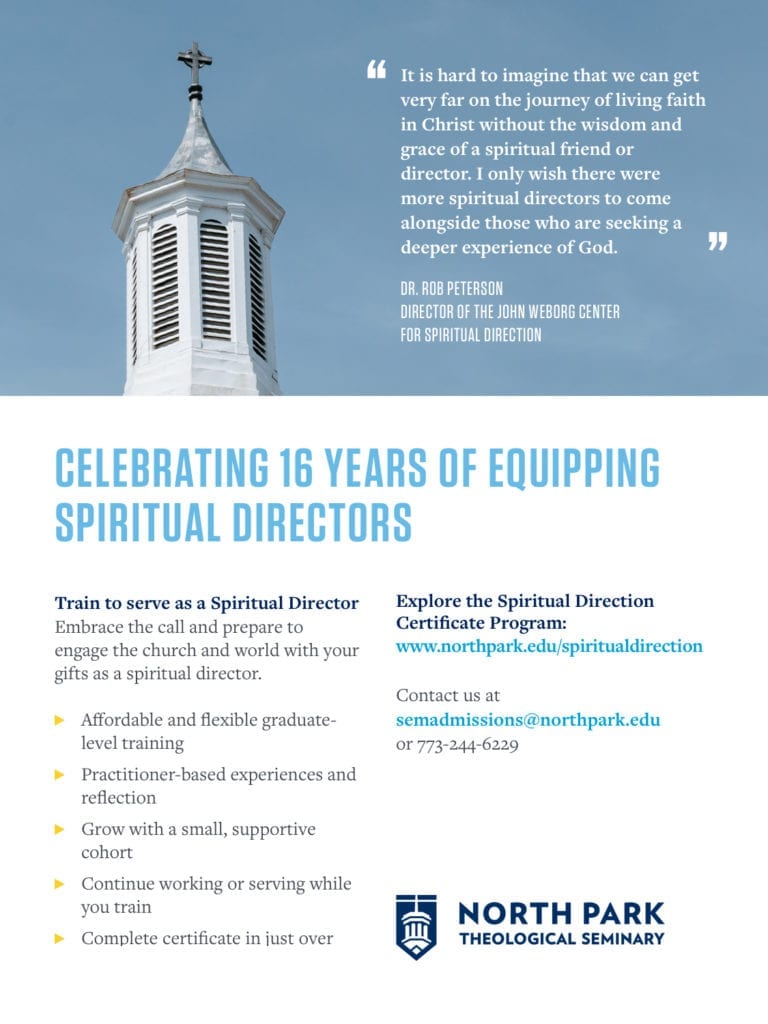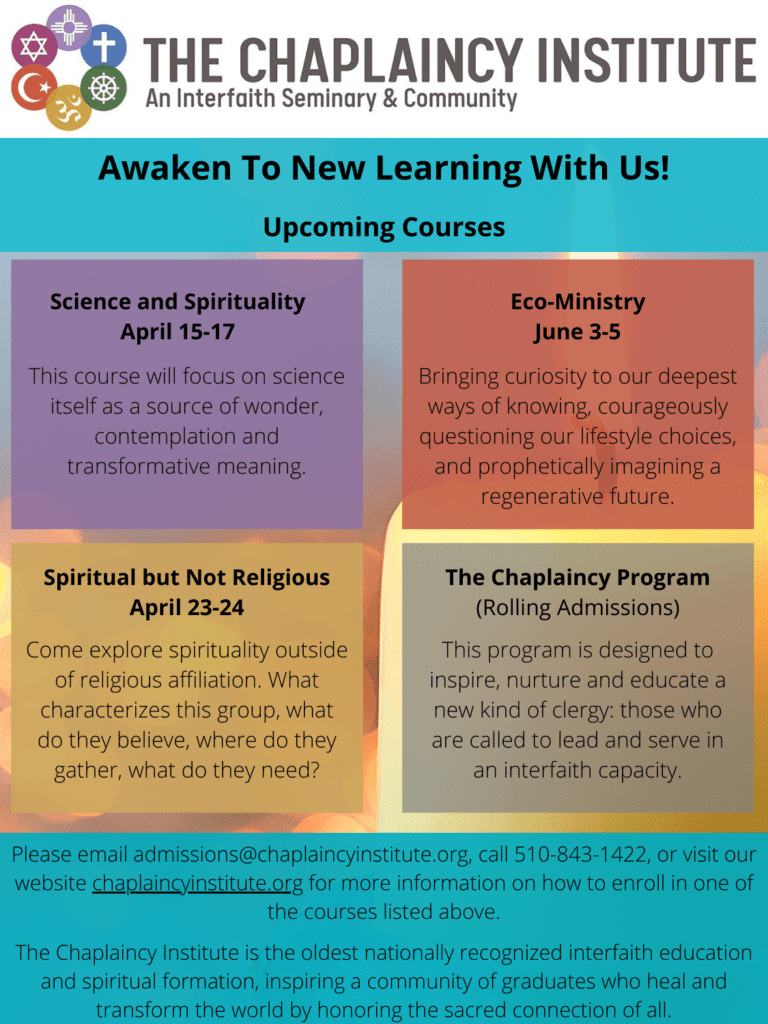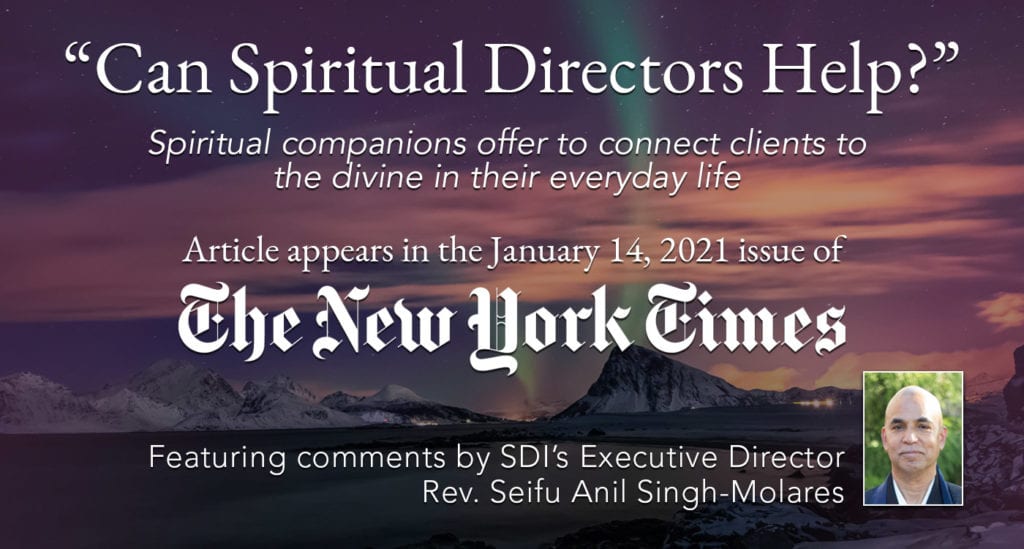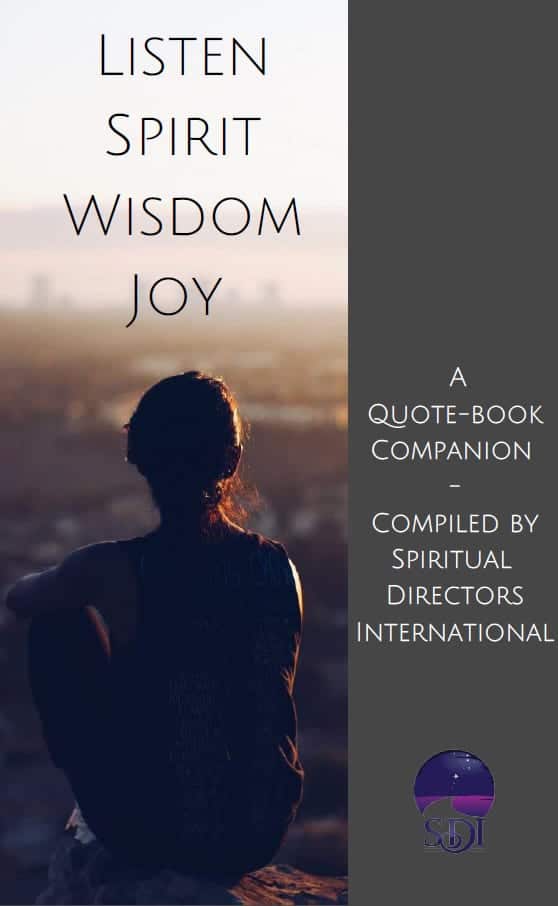Lineage and Spiritual Direction
By REV. SEIFU ANIL SINGH-MOLARES
What does it mean to be an authentic spiritual director? No question is more important to our calling. Rev. Seifu Anil Singh-Molares, SDI’s Executive Director, addressed the hallmarks of spiritual direction and spiritual companionship in a recent Listen issue. (You can read it aquí) In this short dialogue, we go even deeper as Rev. Seifu focuses on the importance of lineage with past and future spiritual directors – honoring both deep connection and deep exploration.
Editor: Lineage. Why does it matter to me if I want to be a good spiritual director or spiritual companion?
Rev. SeiFu: Lineage connects us and disconnects us. It connects us through time – in my case to the historical Buddha of 2600 years ago and the example – and the spiritual direction and companionship – he still provides me on a daily basis. I receive this through his teachings, but also through his non-teachings – meaning the space created for intuitive awareness and connection with the universe. This is something all great spiritual directors and companions do as they invite us into communion with what we in Zen call “beyond the beyond,” what others call God or Tao or Brahman, or any number of other descriptors.
And so, there is that sense of lineage to the past. But it also connects us to the future. We are part of this chain of connected spiritual directors – past, present and future – and we are all doing our part to keep that chain alive, to keep that connection alive across time and space. That’s what good spiritual companions do. There’s lineage in that sense where we honor each other – people we’ve never met physically and will never meet physically – but we are connected deeply and intimately to them. That’s the connected part of the chain.
Editor: How does lineage disconnect us?
Rev. Seifu: The disconnected part is the exploration of the unknown. I’m not talking about disconnection in terms of alienation. I’m talking about disconnection in terms of contemplative opportunities. In some very true sense, we are beings with such limited capabilities that there is much more to whatever we feel and intuit than we can process rationally. These are things that resonate on multiple levels beyond our own awareness. And though they are beyond our intellectual understanding, we can certainly feel our way into them, or meditate, or dance, or whatever tools we use to tap into that base. So, paradoxically, we disconnect to find a deeper connection – exploring the same mystery that greeted our ancestors and will greet our descendants.
Editor: You have been part of the Buddhist tradition for more than 40 years, exploring both connection and disconnection. What has your lineage taught you?
Rev. Seifu: If someone asked me what the main takeaway was from all of these explorations over these four plus decades, it’s that we are not seeking perfection because there is no such thing. This is a path of constant awakening and reawakening, of birth and rebirth. Every day is a new beginning. Our teachers are imperfect. We are imperfect. And that’s okay. We’re not striving for perfection. We are striving for maturity. And maturity is hard won. It’s the school of hard knocks that teaches us. That teaches us humility. That teaches us temperance. And that teaches us perspective most importantly.
All of us can complain about lots of stuff that has absolutely no importance and no bearing whatsoever. And yet we’re so invested in it. And often what happens is we completely miss this bigger picture that is being offered to us on a platter every moment. It’s right there. It’s this eternal connection. It’s this eternal invitation that says, “Don’t be afraid. Don’t worry. Don’t fret. Don’t be anxious. Just be. Commune and flow and try to be as loving and responsive as you can.”
One of the key takeaways from this chain for me is that we learn at least as much from failings as successes – both our own and others. And so, every day’s a new beginning. The last day of our life – our last breath – will be a new beginning. And these new beginnings are all part of a legacy of our shared lineage as spiritual directors and spiritual companions.
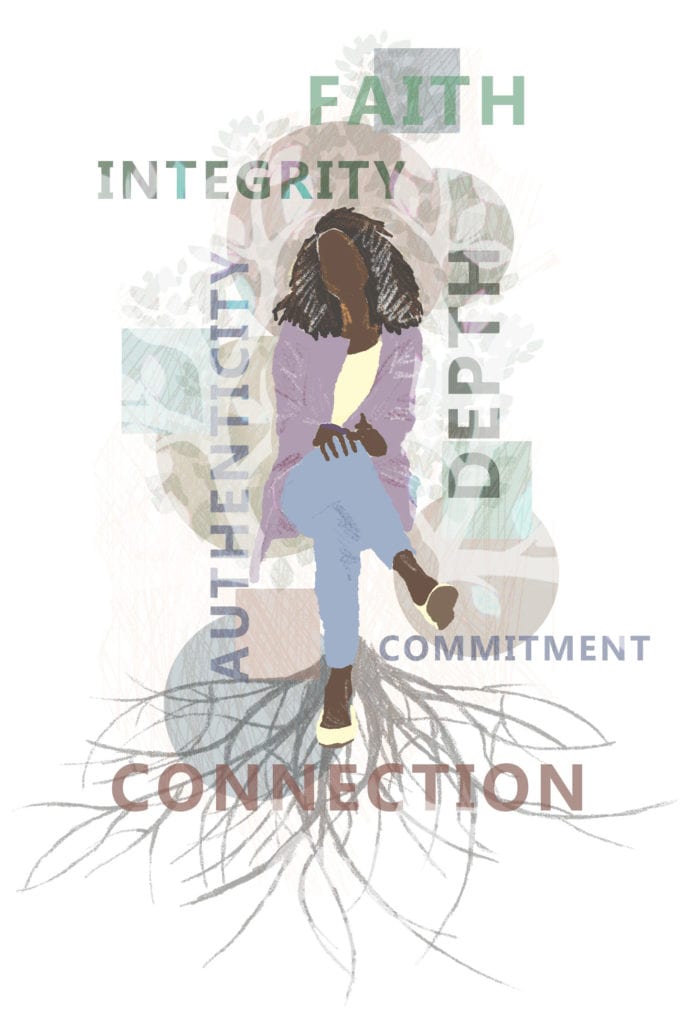
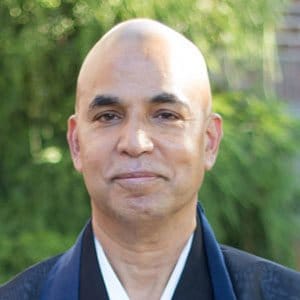
Rev. Seifu Anil Singh-Molares
Executive Director, SDI
6 Questions
By Laura Fairchild
Editor’s note: The question of how we communicate our calling is central to how we can make that calling sustainable. In this short selection, SDI looks at how one young spiritual director uses the FAQ format to introduce people to spiritual companionship and explain how they can get started working with her. Handcrafted beer, anyone? 😉
¿Qué es la Dirección Espiritual?
Spiritual direction is a holding space for people to look inward and connect with what is divine and sacred. One might use the time of deep listening to examine their intentions, reflect on spiritual experiences, and attend to their inner person through their faith framework. Many use the time to broaden their field of attention to God’s presence or the presence of what they know to be their guiding power.
Spiritual direction is the sacred work of reclamation—making space to attend to our wounds and weariness. In this practice we are held and affirmed of our inherent worth; it is a way to honor the self and open the heart.
Who uses Spiritual Direction?
Anyone can begin spiritual direction, however, a seeker typically has a formed concept of their guiding force, accepted belief system, or faith tradition and wishes to deepen their connection with the Divine through that established framework. Essentially, the sessions are for spiritual maturation and not formation.
What is a Spiritual Director?
Spiritual Directors are similar to a local handcrafted beer! They are a true work of craftsmanship as each director has their own style and unique presence. However, you can expect them to listen intently, ask beautiful questions, and be present with your emotions. Sessions are personalized to your individual needs and experience of the guiding force(s) in your life. Your director will meet you where you are while bringing the flavors of who they are for a satisfying relationship.
Why do I need Spiritual Direction?
As humans we are deeply vulnerable, experience loss, and endure day-to-day wear and tear on our spirits. Sometimes we must carry magnificent burdens or live in spaces where our inherent worth and importance go unrecognized. We believe that nourishing spaces of refuge and sanctuary are important to include in our repertoire of self-care in exceptional times and ordinary.
What are the benefits?
Over the course of time with your director you may find that you have greater clarity, feel more grounded, and are more aware of your spiritual needs. Hopefully, you will be more enlightened with a richer understanding of where you are on your journey and where you are going.
How do I get started?
If you are interested in spiritual direction, go to our contact page to send us a message requesting more information or book a clarity consult with one of our directors.
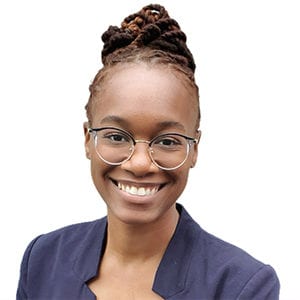
Laura Fairchild
Laura Fairchild, MDiv is a New Jerseyan and graduate of Princeton Theological Seminary, has a faith background in Christianity from the Baptist perspective (NBC). She is the founder and lead spiritual director of Fairchild Ministries. She embraces a philosophy of radical inclusivity offering sacred space to all in need with an emphasis on Black women in leadership. Her style of direction couples a gentle demeanor with a warm, inviting, and hospitable presence. In the disguise of chaplaincy, she has been a spiritual companion to older adults, college students, and everyone in-between as they navigate behavioral health challenges, living with cancer, and other life-changes. Laura’s philosophy of spiritual direction is simple: Love your whole self. Love yourself whole.
Coronavirus and Human Frailty
By Nathan Bettger
In the midst of this tumultuous and uncertain time, the ongoing spread of coronavirus has highlighted something I have been shown in the last few months. Frailty. Vulnerability. Weakness. Aging. These aspects that are very much part of what it means to be a human, are so very much scorned and looked down upon by our Western North American Culture. Here, we live in an age of youth, strength, ability, progress, and improvement. These are riddled through the news, hammered in our advertising, and get more likes and followers than anything else in our popular social media streams. When these things begin to fade, as they always do, one’s worth and usefulness fall away and are lost in the halls of the nearest skilled nursing facility.
"What is true and what has always been true is that as one’s body begins to fade away, one’s spirit tends to expand."
But frailty is part of the human experience. It is more real than anything we see on our smartphones, streaming television, and news feeds. We live with it and we die with it. Frailty. What is true and what has always been true is that as one’s body begins to fade away, one’s spirit tends to expand. This is not to say they are separate, by any means, one’s body and spirit, but when we are strong, we tend to rely on our external strength to get by and when we are not strong, we have to draw our strength from somewhere else. This is a very real possibility for each of us, an invitation, but unfortunately, one that is missed by countless men and women as they near the ends of their lives (This I have seen in sitting with hundreds of individuals as they stare down the ending of their days). Growing our internal strength, expanding our spirits, can happen with very little effort on our parts. It truly is a natural process, but it does mean that we have to let the natural process happen. What is most common is a resistance to this aging, a fear of the frailty, and too often a denial or blatant condemnation of the limits that are so naturally imposed on our natural body. What happens when we deny ourselves this acceptance is a shrinking dying body and a shrinking dying spirit. We deny ourselves the possibility of internal strength that transforms the world as others behold in awe the immensity of our spirit or presence.
What happens naturally in the world, happens naturally in each person. And what happens naturally in each person, happens in the world. Frailty is a reality. Each being is dependent on the greater network of beings. Our mother, the Earth, is perhaps the most resilient being…. but her waters and her wild places and the heavens that surround her are vulnerable and have changed immensely over her billions of years, not to mention the centuries that we humans have walked her lands. It is only we humans who have denied this vulnerability and tried to conquer it, to overcome it, to use it for our own gain. But why would we want to overcome and conquer the very thing that would lead to our transcendence? This is a good question to wonder about. Wonder about the strange thinking that our species has come to. It is easy and convenient to be grateful for the things that benefit us and bring us comfort. Much more difficult to have gratitude for the things that break us down or even bring about our demise.
We must go down before we can go up. We must die before we can live. Consider the scriptures, the wise teachers, or Life itself, our greatest teacher.
Here we are as a global community, spinning out in the lack of control, the uncertainty, the vulnerability that has been our reality all along. Something else has been with us all along, too. This is the opportunity and the invitation to grow and to acknowledge how connected we really are. Now is not the time for fear. Now is not the time for blame. Now is not the time for arrogantly claiming how strong and powerful our country is. Now is the time for coming together, for compassion. Now is the time to remember that our lives are not just about us as individuals and our immediate families. We expand, we grow, we transform for the sake of the world and all her beings, big and small. The choices we make are for all, not just for ourselves. You want to hoard resources in case there is a shortage? When you take more for yourself it means there is less for the “all.” (Watch and see how small and stingy people will become as they seize things for themselves, as they exert their strength and stake their claims.) This is the way of the world. But there is an overwhelming abundance of compassion, a never- ending stream of that which sustains our spirits. And this grows as other things fall away. Watch and see how it happens.
Coronavirus has brought about stress, pain, and heartbreak for many. Health care workers will be overwhelmed and overworked (as they already are). Many elderly speed more quickly to their deaths. But in the midst of this, there is growth. There is the opportunity to honor our frailty and vulnerability and shift our values to things that will elevate us to another stage of connection. A time like this is a mere instant in the timeline of the world. And yet when the factors are right, an instant is enough time to change the trajectory of the world. We can remain awake, looking for the bigger picture, holding the paradox, and expanding our connection to all that is beyond us. This is our invitation. May it be so.
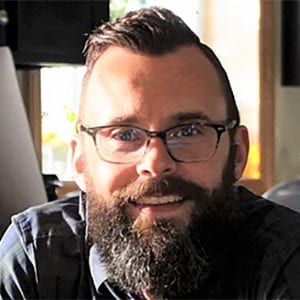
Nathan Bettger
Nathan Bettger an SDI New Contemplative for 2021, is a board-certified hospital chaplain and Director Espiritual from Oshkosh, WI, where he lives with his wife (Kat), his two sons (Brendan Arthur and Owen Raine) and his Welsh Terrier (Wendell). Nathan is committed to nurturing connection and community, through our relationships, our bodies, our sense of self, the land that we live on, and our experience of the Divine. Nathan received his Masters in Divinity from Bethel Seminary in St Paul, MN and Certificates of Spiritual Formation and Spiritual Direction from George Fox Seminary in Portland, OR. The post above was originally published on Nathan’s own site. Have a look here: https://natebettger.com
Our Sponsors
Why Curiosity Is Important for the Emerging Spiritual Director
By Allie Kochert
What lights up your soul? What brings joy to your moments? When do you feel wonder, awe?
Spiritual directors often ask questions like these as we develop relationships with those who we companion. We are blessed, honored, and privileged to get a chance to offer ourselves and our attention to the seeking souls of other “spiritual beings having a human experience.”
Yet we are human, too, and what we do sometimes can be hard work. Indeed, relationships are never really easy per se, and we are in the business of building relationships— through our presence with our directee and the Divine.
As emerging spiritual directors, we are sometimes unaware of how our own reactions can unintentionally bubble up and hinder our ability to be fully present to our directee. When we need to fix, advise, cajole or otherwise change our companions and their reactions, we can sideline the movement of Spirit. It is ethically questionable to blindly speak our strong reactions. Yet, we still face the issue of what to do with our rising thoughts, feelings and sensations.
When we notice our pulse racing, or emotions rising, or thoughts racing, we can react with fear or an attempt to block the feelings we are experiencing:
“I shouldn’t feel this way.”
“I need to be present and not judge.”
“I don’t want to make this about me.”
The problem with these “shoulds” is that they dismiss our humanity and reduce the space for our own presence in the room. (A spiritual direction session includes the director!) Our call is not to totally dismiss ourselves in the session, but rather to acknowledge our own reactions from the posture of curiosity that we grant so easily to our directees.
Perhaps instead of worrying about our reactions, we may notice, breathe, and allow.
What could happen if instead of attaching to the “shoulds,” we notice with openness and interest:
“What could it mean for me that I have these reactions?”
Perhaps instead of tensing with fear or concern, we may provide space to inquire later, in our journal or with our own spiritual companion:
“How wonderful it is for me to be aware of what I feel when I’m in session with my directee, what can I learn from this?”
“How do my feelings—anger, distrust, fear, sadness, disgust—affect my body when I have them?”
“How might these unspoken feelings affect my directee?”
Our unconscious reactions to directees often require a good amount of self-reflection and peer supervision to uncover. (Psychotherapy calls these reactions “countertransference.”) But the effort to be open, honest and aware of ourselves is worth it. As we become kind and compassionate to our own flaws and shadows, we are more able to let go of the emotional roadblocks that keep us from connecting. In this way, curiosity is a game-changer, allowing us to move beyond our personal reactions to deep listening and openhearted presence.

Allie Kochert
Allie Kochert, MA, LPC is a spiritual companion, psychotherapist, writer, and mom of three. Last year she completed her training in Jungian-based spiritual direction at the Haden Institute. She is the owner of Rooted Growth, dedicated to supporting “helpers and healers”– those in the ministry and caregiving professions. In addition to her retreat work and course offerings, she provides counseling in Pennsylvania and spiritual companioning worldwide. Her website is www.rootgrowthrive.com and she can be reached at [email protected].
Spiritual Direction: A Movement Toward Soul Wholeness
By Jennifer Olin-Hitt
It’s not uncommon for Americans in our 21st century to find their way to a mental health clinic.
In the U.S. today, according to the DSM-5, 46% of adults are likely to develop a diagnosable mental disorder. There are a variety of reasons for the statistics: economic stressors, environmental challenges, inadequate social resources, and often, simply a greater awareness of and the reporting of diagnoses. For the millions of people affected by mental health disorders – depression, anxiety, personality disorders, etc. – mental health professionals provide relief and hope. Psychiatrists, counselors, marriage and family therapists are important resources, contributing greatly to the well-being of society.
Not all intrapersonal suffering can be summed up in a diagnosis, however. The human condition is filled with moments and seasons of struggle that are not categorized neatly in a mental health textbook. Loss can lead to deep grief. Ethical dilemmas in the workplace can open up great turmoil of conscience. We become angry at our loved ones. We can act in ways that we regret. Mid-life can bring questions of meaning. Children challenge our values. Some of us wake up in the night with questions of existence:
- What is my purpose?
- Is there life beyond this life?
For questions and moments such as these, the struggling person may turn to a spiritual director. What follows is a brief overview of spiritual direction as well as some ways that spiritual direction intersects with mental health therapy.
Spiritual Direction: A Movement Towards Soul Wholeness
Spiritual directors are those who, most typically, help individuals move towards greater soul wholeness. While I am most familiar with spiritual direction from within the Christian mystical context, spiritual direction is an ancient practice that has roots in most of the major world religions. A spiritual tradition (be it Buddhist, Jewish, Christian, Pagan, Indigenous, etc.) is the weaving together of a worldview – questions, teaching, ritual, values, and community – all for the sake of passing along meaning and purpose to its adherents. Within these spiritual communities, throughout the centuries, spiritual directors function as healers, teachers, guides, and midwives. They often meet one-on-one with a seeker. They listen to stories of soul-sickness and struggle. They help a person to name stories of hope and to discover resources of strength within their spiritual tradition or within the even larger framework of braided spiritual questing.
The title “Spiritual Director” is somewhat of a misnomer. The Spirit is the true director. The human spiritual director is simply one who is trained in knowing the questions to ask. She herself is a seeker and she knows the terrain of spiritual questing. A spiritual director does not have a textbook answer for the suffering person. Rather, a spiritual director spends much of her time simply being available to the spiritual companion who has come to explore. Sometimes spiritual direction is simply a ministry of presence: to laugh with those who laugh and to weep with those who weep. The spiritual director can help the companion savor the best of the human experience and to hope for a better day during times of suffering.
The Many Forms of Spiritual Direction
The most typical form of spiritual direction is a sixty to ninety-minute session in a quiet place where conversation can flow between spiritual director and spiritual companion. In this way, spiritual direction shares commonalities with mental health therapy. It often is a verbal exercise: the externalizing of pain and suffering through the telling of stories and the speaking of words. Like an effective mental health therapist, the spiritual director knows how to actively listen, to reframe the challenges, to ask questions in ways that open up greater conversation. However, unlike mental health therapy, spiritual direction often feels less goal-oriented. The mental health therapist may help the client increase his parenting skills or de-escalate anxiety. The interventions of the mental health therapist are future-oriented and change-focused. Spiritual direction conversations are often very present-focused. A spiritual director may help her companion to reflect upon how God typically communicates. A spiritual director may guide his companion to listen in a new way for wisdom or he may help his companion discern untapped resources of hope. Through this encounter, great intrapersonal change might happen, but such change comes as result of a spiritual experience, not as the stated goal.
Spiritual direction often is a multi-sensory experience. A Pagan spiritual director might invite her companion to walk in the woods and listen for new sounds. A Buddhist spiritual director may focus on the act of sitting meditation.
At the Haden Institute for Spiritual Direction where I trained in Flat Rock, North Carolina, mornings would begin with yoga along the lake. Evenings would wind down with music circles. It was not uncommon to visit the art room to paint the memory of a night dream. A poem or a piece of sacred writing would often become a springboard for guided meditation. During those intensive training workshops, I invariably discovered a new way to envision the Holy and to imagine my own life path unfolding. During one particularly painful season of vocational questioning, multiple visits to the art room helped me to externalize a fear I had buried. I shared the picture with my own spiritual director, and the process helped me to experience greater courage within myself.
Some Practicalities of Spiritual Direction
Unlike the mental health professions, spiritual direction in the United States has no ties to managed health care. This means that a spiritual director may practice without a state license, because there is no such state licensing board. Depending upon one’s perspective, this freedom is an asset or a liability to spiritual direction. On the one hand, a spiritual direction practice can be unencumbered from weighty overhead and the strings of institutional bureaucracy. The spiritual director can be free to focus on the relationship and on the process of healing. On the other hand, such freedom can lead to lack of accountability. As a practicing spiritual director, I strongly advocate those who would call themselves spiritual directors to receive training from a reputable organization. Most of the major spiritual traditions have seminaries and training centers that certify practitioners to provide ethical and responsible spiritual direction. If you wish to work with a spiritual director, take some time to interview her. Ask about her training, and if she herself receives regular on-going spiritual direction.
Spiritual Directors International is the largest network of world-wide spiritual direction practices. While they do not accredit spiritual directors, SDI does serve as an international network that connects spiritual directors with each other and with resources to improve our work in the field. SDI hosts international conferences and publicizes its members’ profiles so that seekers can discover who and what is available.
Generally, a spiritual director will charge something for her services. While this sometimes has been a controversial topic, I advocate the practice for several reasons.
- A fee will set boundaries around the time of spiritual direction, helping to maintain the sense that this is an agreed-upon relationship.
- In our American culture, the offering of payment implies an investment in the process.
- Spiritual directors are usually people who are never going to “get rich” from their work, but they have invested time and resources in their training and personal development. Often a fee is a practical reality, necessary for the spiritual director to maintain the best practice possible. Each geographic area seems to have ranges of fee structures for spiritual direction. And almost every spiritual director I know offers alternatives if the fee is simply too much for the companion to offer (sliding fee or the trading of services, although this second practice comes with its own set of challenges).
An Important Alliance
The sacred texts of all world religions as well as our history books show that people throughout human history have struggled. We read of mystical visions, great longing for union, journeys of suffering, and moments of ecstasy. In response to the human condition, throughout cultures and times, many diverse people have devoted their lives to help alleviate intrapersonal suffering and to magnify wellness. While our 21st century values the medical model of mental health therapy, there is a growing body of contemporary people who also value the effectiveness of spiritual direction. The wise spiritual director will know when her companion is struggling with a condition best approached by a mental health therapist. But just as importantly, a mental health therapist would do well to recognize a Mystery that extends beyond clinical treatment goals. In our world of both Spirit and Matter, suffering persons need the best of both worlds – mental health therapists who understand the complexities of diagnoses and social systems, but also spiritual directors who walk with companions into the mystery of Spirit.
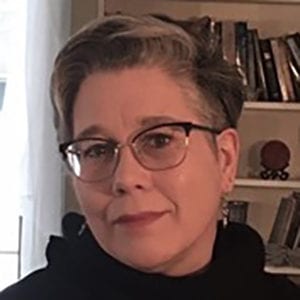
Jennifer Olin-Hitt
Jennifer Olin-Hitt lives in Ohio and spends her days as a Mental Health Therapist in the field of family therapy. She talks with teenagers and children about important things like anger, hope, and fears. In addition to her work with teens, Jen is a Spiritual Director and has been a public speaker in many venues. Jen parents a couple of young adults. She is married to Michael Olin-Hitt. She gardens vegetables and weeds. And every now and then Jen finds time to walk. Her website: https://jenniferolin-hitt.com/ . This post was first published on The Braided Way, a website and magazine which aim “to support an individual’s spiritual development, while influencing our larger culture toward inter-spiritual (and inter-religious) understanding, acceptance and engagement.”
Our Sponsors
Vital Connections: Claiming voice and learning to listen – An Online International Conference on Ageing & Spirituality – June 2021 –
More information, Call for Abstracts and Registration open at uwaterloo.ca/ageing-spirituality/
Breathing
By Tessi Muskrat Rickabaugh
I haven’t been writing much over the last few years. A few blogs here and there, some sporadic journal pages, but nothing approaching the near-continuous outpouring of words that characterized most of my life before that point.
I’m talking less, too. Sometimes this feels okay, as I wonder through my days in a kind of comfortable observer-silence, listening to others express their thoughts, opinions and beliefs with the loud confidence – or the soft, quiet insistence – that passion can bring. As I write this, I sit on a picnic table beside a stream, alone at a festival of thousands of people eagerly engaging with each other on issues of theology, spirituality, social justice, healing, faith, religion and politics. And then there’s me. Moving quietly from workshop to workshop, finding time alone in between to journal a little, or just sit beside the river and listen to the water. Feelings of guilt arise now and then, usually couched in the language of “shoulds.” I should be meeting people. I should engage. I should have something to say about this issue. I should have an opinion. I should know what I believe.
I began exploring yoga last year, in a casual “test the waters” sort of way. In the process, I was introduced to the idea of four-part breath. As we practiced it in class, this meant breathing in for a count, holding for a count, exhaling for a count, holding the emptiness for a count, and then beginning the process over. I’m used to breathing. I’ve been aware of my breath for a long time, have even worked hard at breathing deeper and releasing longer than I would naturally, and of course I’ve held my breath since I was a kid playing at putting my face underwater in the bath. What I had never, ever done before was empty myself of every bit of breath I could, and then stay with the emptiness.
I panicked. I gasped. I breathed in as if I had believed I would never breathe again, and completed several breath cycles of my own before catching back up with the class on exhale and trying again.
Emptiness is scary. It aches in a way fullness does not, and rather than carrying a sense of too-muchness in need of release, it just feels endless. What if I never breathe again? What if my lungs just shut down; forget what to do? What if I can never write again? What if I never find something to say?
What if I never really know what I believe again?
I still don’t really know the answers to these questions. I’ve taken in deeply, I’ve poured out everything I have, I’ve taken in more, I’ve felt full to bursting with wonder and beauty and faith and theology and I’ve released everything that I’ve learned into the world, and I’ve repeated and repeated and repeated this cycle. It’s a two-part way of spiritual breathing. In and out and in and out. Faster and more and better. The problem with rapid in and out breathing? It can easily turn into hyperventilating and exhaustion.
So here is my work: to take in when I’m ready to take in. To sit with the fullness when I am full; to give it the time to do its work. To give out when I feel ready, and to sit in the discomfort of being empty yet unable to take in more.
To remember that all these parts are a part of the holiness of a presence that is closer to me than my own breath.
To trust that each step will follow the other, in its time.
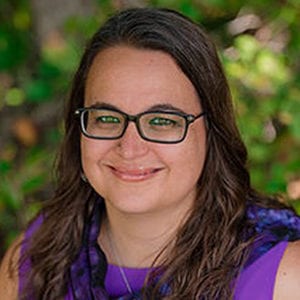
Tessi Muskrat Rickabaugh
Tessi Muskrat Rickabaugh is a spiritual director, author, creator of sacred spaces and workshop presenter for SDI’s 2019 conference. She is a graduate of Shalem Institute’s spiritual guidance program, and a former SDI New Contemplative (2015). Tessi makes her home in Fulton, Missouri, where she provides spiritual direction in person and online, primarily serving post-evangelical young adults and members of the Deaf community. A Native woman of Cherokee and Irish descent, Tessi curates The Barefoot Journey, an online community of people who engage with stories as a way to foster peace and openness toward self and others and promote spiritual healing. She loves to sit in sacred circle with other women, facilitate group spiritual direction, and explore the wisdom offered by dreams. Tessi is finishing up her Bachelors’ Degree at the University of Missouri, majoring in Religious Studies and Women’s and Gender Studies with a minor in Psychology. She expects to pursue a PhD in Counseling Psychology with a specialization on religious and sexual trauma.
15 Open-Hearted Questions
for 2021
By Steven Crandell
In every open-ended and open-hearted question, there is a quest.
Who am I?
This is just such a questing question.
What is my destiny?
This is another.
If these questions seem daunting, remember that a true response is always a good response.
“I don’t know,” can be just such a true response.
“I don’t know” can be the beginning of a great adventure. It can create an openness to learning and growth, to more open-ended, open-hearted questions, such as:
- How do I find out who I am?
- What makes my heart full?
- What breaks my heart?
- When do I experience joy?
- When I am still, what arises within me?
- When I am in nature, what arises within me?
- How do I serve others?
- How do I listen to others?
- How do I like others to listen to me?
- Who is a true companion to me?
- How do I companion others?
- What makes me feel dead inside?
- What makes me feel alive – body and soul?
Practice challenge
(bring a pen and journal or paper):
- Find a place of stillness and peace – and invoke stillness within.
- Welcome what is.
- Let go of thoughts and judgments. When they return, greet them fondly and let them go again. As often as you need to. Lovingly. Each time you let go, you may feel lighter.
- When ready, write out each question above, saying it as you write. Then without hesitating – or thinking, if possible – just write down whatever truthful response arises, saying this aloud, too, as you write.
- Go through all questions in this way without pause, answering them all.
- Then invoke stillness again.
- What arises? Note any new open-hearted questions that come. Add them to your list.
- If you like, do it again. But don’t try to give a “correct” response or attempt to be consistent. Simply embrace what is and what arises. Truth is infinite and enduring but it also evolves – as we encounter it.
- Note: if you do not have pen and paper – and you do not have the memory of a computer – no worries. Just choose one question from the list, invoke stillness and truth, say the question out loud and then answer it out loud. Sit in stillness and witness whatever arises. Explore what arises if you wish. Note any new open-hearted questions that arise.
Happy questioning.
Blessings to you all in all you do, in all you are, in your truth and your questions. May you be truly free and may you witness the light that is already within you and feel emboldened to share it.
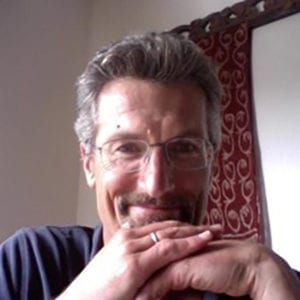
Steven Crandell
Steven Crandell is the director of content and communities for SDI. He sees spiritual companions and spiritual directors as the catalyst in an ongoing “contemplative revolution.” His unofficial job title is “Director of Encouragement.”
Publisher: Spiritual Directors International
Executive Director: Rev. Seifu Anil Singh-Molares
Editor: Steven Crandell
Production Supervisor: Matt Whitney
Production Assistant: Ann Lancaster
Submissions: [email protected]
Advertising: [email protected]
Vínculos is published four times a year. The names Spiritual Directors International™, SDIWorld™, and SDI™ and its logo are trademarks of Spiritual Directors International, Inc., all rights reserved. Opinions and programs represented in this publication are of the authors and advertisers and may not represent the opinions of Spiritual Directors International, the Coordinating Council, or the editors.
We welcome your feedback on any aspect of this issue of Vínculos, or on SDI as a whole. Please send your comments to [email protected].

SDI es el hogar del compañerismo espiritual
PO Box 3584
Bellevue, WA 98009



